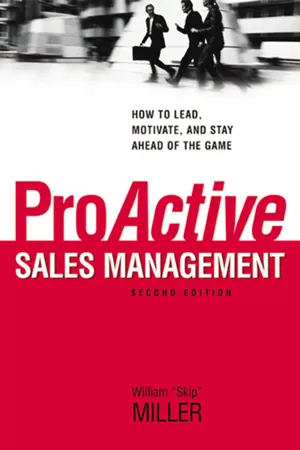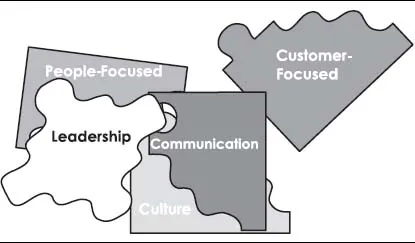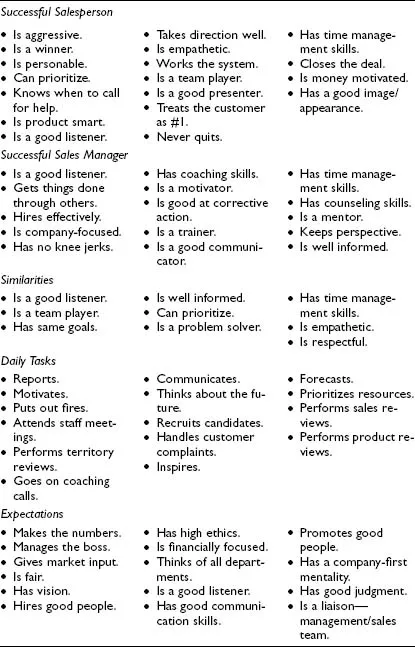![]()
Chapter 1
ProActive Sales Manager—Defining the New Breed of Sales Manager
ProActive Sales Manager. What a title. Who wouldn't want to be a ProActive manager? Who wouldn't want to be one step ahead? One leg up on everyone else. Always prepared for the crisis situation. Having the right answers for the right questions in the quarterly management sales review. Knowing where to spend your time and resources wisely—ProActively.
By definition, “ProActive” means ahead of the game, someone who always thinks before she acts, and someone who is one or two moves ahead of the competition. Some people dislike the word “ProActive,” probably because they are so reactive they just reject the notion that anyone can be any different. But ProActive sales managers do exist. They are few in number, but they can be found.
How can you become one of the ProActive elite? What does it take? We have been observing and working with sales management on this exact topic for years. Highly competent sales managers have the ability to spend their limited resources on the situation that needs to be addressed. How do they do it? It's not magic. They do it by being ProActive.
You are about to embark on a journey through the day-today tasks of sales management. We focus on the tactical aspects of the sales manager's roles and responsibilities, such as what questions to ask during an interview, how to conduct a sales meeting, how to motivate, and what specific metrics you should measure to. However, the overlying strategic theme is about being ProActive.
Being ProActive doesn't mean waking up in the morning and deciding, “Hey, today I am going to be ProActive and get ahead of all my tasks for the day.” It is not the latest overused buzzword. “I'm ProActive. Are you ProActive?” Short-term, buzzword approaches to being ProActive may work on any given day, but it requires a tremendous amount of energy, and it might not be possible to sustain.
Everyone has “power days,” when they feel they have a tremendous amount of energy and can take on the world. These short bursts of ProActivity last only a few hours. Why? The rest of the world forgot you were trying to be ProActive and has now conspired to change your agenda, or at least reverse your direction. There are even canned phrases for this reversal effect, which is illustrated by the following quotes:
- “I was doing so well; then my boss came in with his agenda and shot the rest of my day.”
- “The day started out really strong; then the fires came. Why is it I spend better than half my day putting out these fires? And they are not even my fires!”
- “How did this happen? All of a sudden, I had the monkey on my back, and I was being assigned to tasks that should have been on other people's agendas. Too many monkeys and now I am working everyone else's to-do list but my own!”
These are actual quotes taken from sales management training seminars. We all have good intentions and want to be ProActive. Being ProActive is not a task, but a strategy. It allows you to complete the day-to-day tasks under the umbrella of ProActivity. It is a way for you to make decisions that affect the future, not the past, and to work to your own agenda, not someone else's. Work to your priorities, not to the priority du jour. ProActive sales managers are ProActive on the overall strategy, as well as the day-to-day tactical decisions. It is a way of effectively managing and invoking a much-requested discipline on themselves. It ends up becoming part of their culture.
How do you begin on this journey that will allow you to do more in less time and be effective beyond belief? You begin by finding out what the sales manager's actual role and responsibility is.
What Is the Actual Role of the Sales Manager?
Sales leadership. That's it. By any other name, this is what companies and employees want in a sales manager. For an effective sales manager, leadership is the key ingredient. How do you acquire leadership? What makes sales managers effective leaders? Let's solve the Leadership Puzzle (see Figure 1-1).
A quick story. Bob remembers when he first became a sales manager—both a wonderful and scary proposition. He had been a very competent salesperson. “Quite arrogant, some may say. I was a good salesperson with a high degree of ego thrown into the mix.”
Figure 1-1. Leadership Puzzle.
Bob's first manager at the time, Kevin, was a very effective sales director, one of the best. Well, when a first-line sales management position opened up, Kevin offered it to him, but a bit reluctantly. “Kevin was not sure about my ability to transition from selling to managing, whatever that meant,” he confided. After assuring Kevin in his most straightforward and brash manner (he thought it was confidence) that he could do the job, they had a great discussion. Finally, Kevin asked what reservations he had about the job. Bob still remembers looking Kevin straight in the eyes and saying, “I know I can do the job. But there is one thing that escapes me. How do you get salespeople to respect you? How do you lead them?”
Kevin's response was, “You just took a towel, put it in between my ears, and cleaned out all the reservations I had about you being a successful manager. Let's get started.”
Respect and leadership. How do you ProActively acquire these traits? For an answer, let's look at five key questions in the leadership puzzle.
- What makes a successful salesperson?
- What makes a successful sales manager?
- What are the similarities between the two?
- What tasks does the sales manager perform on a day-today basis?
- What are the expectations placed on the sales manager?
Figure 1-2 shows some typical responses to these questions, taken from actual responses given at our sales management courses. So what do these questions tell us? What is to be gained from this exercise? Let's take it one question at a time.
What Makes a Successful Salesperson?
First, what are the characteristics of a good salesperson? Aggressive, personable, product smart, never quits, empathetic, good listener, and so on. The list in Figure 1-2 is not complete by any means, but it does reveal an overall trend: a strong customer focus. The successful salesperson has been trained and has learned to focus his skills and attention on the customer. This overriding trait is necessary for salespeople to be successful. They focus on the customer.
Figure 1-2. Answers to leadership puzzle questions.
How do salespeople get to this point? When does a salesperson stop working for the company and start working for the customer? Let's take a look at a typical scenario.
When Jill, a rookie salesperson, is just starting out, the company does some limited amount of training: some sales training, some product training, and some presentation skills training. All training is focused on helping her deal with the customer. Then, the company points her to the front door and tells her to go sell. Go get orders.
She heads for the door, goes out, and makes a few calls: “Hi, I'm Jill, and I would like a few minutes of your time.”
BAM, she gets the proverbial door slammed in her face. Undaunted, she tries again: “Hi, I'm Jill and…”
BAM, it happens again. Well, after a few more BAMs, the rookie gets a little street smart and figures out how to at least get in the door (another learned customer-focused selling skill).
So, after a rough start, she is in the door and progressing through a sale. She finally gets a live one and a chance to actually close a deal. She now takes the offer back to the boss. Of course, this deal is a little bit unusual, with a little too much discount, tight shipping terms, and very liberal payment terms. But hey, it's a deal.
Of course the boss does not look too favorably on this deal. He rejects it and tells Jill, “You have to do better.”
Jill tells her boss, “The customer is seriously entertaining a competitive offer. We have to accept this deal, or we will lose the order.”
The transformation has taken place. It never fails. The salesperson is looking at the order and knows she can close it. If only her company were a little more flexible; a little more reasonable. The company is not in touch with the competitive landscape and needs to be a bit more understanding. The company is standing in the way of this order…my order! Transformation complete. The salesperson, who just moments before was a company person, someone who worked for the company, was trained by the company, and gets paid by the company, now works for the customer. This customer focus is illustrated by the following quotes:
“I work for the customer.”
“I am the voice of the customer.”
“We need to be a customer-focused company.”
“If we did a better job of listening to the customers…”
“You pay me to get orders! The customer pays our bills.”
So the stories go. The salesperson, knowing she needs to bring deals in to be employed and make a living, now finds it easier to side with the customer, and she continues to develop skills and traits to sharpen her customer-focused skill sets. To do this, she must become independent of the company. She now believes she is the voice of the customer, and if “the company” does not back her, then “the company” is nonresponsive. We train these salespeople to think independently, act independently, report independently, work independently, and sell independently. Is it any surprise they are company independent? They are now customer-focused. They have been trained, encouraged, and motivated to be this way.
When a deal is going down, it is much easier to side with the customer. After all, it is the customer who is paying the bills, and the company should be grateful for the orders that are coming in. Good, marginal, or whatever, an order is an order and the salesperson did the best she could to get the best deal. (Salespeople have great rationalization capabilities on what constitutes a good order.) So the company should take the deal.
Jill's experience is a bit exaggerated, but not too far from the truth. Good salespeople have developed these customer-focused skills into an art form and are very good at being the voice of the customer. The voice of the marketplace. The voice of the street. Customer-focused.
What Makes a Successful Sales Manager?
What makes a great manager? What separates the top managers from the mediocre ones? The ones who win time and time again—how do they do it? Again, the list in Figure 1-2 is not complete, but what you will find is that successful sales managers demonstrate strong people skills. Getting things done through others. They are people-focused. These skills differ from the skills you value in a salesperson.
Motivation, coaching, counseling, and mentoring are people-focused skills and traits that good sales managers need to get things done through others. However, these traits do not come from being a good salesperson.
Salespeople are customer-focused. Sales managers are people-focused. These skills are as different as night and day.
Successful salespeople love being the individual contributor. They love the independence, which to a large degree is what made them successful. But these customer-focused traits will not lead to success as a sales manager. Why? Sales managers need to work with and through people. They cannot act so independently.
It is no secret that some successful salespeople are not good at being sales managers. The reason is obvious. It is not what they were trained to do. They were trained to manage customers, not people. By the way, it may not be what they want to do either. Given the choice and the knowledge of what the two positions actually are, salespeople need to understand what the management job entails before they sign up, are recruited, or get commandeered.
In the “Newly Appointed Sales Manager” class that I have facilitated for the American Management Association for many years now, many of the new sales managers are still trying to “outsell” their current sales team members. “Do it my way,” “I'll show you how to do it,” or “This was how I was successful” are still prevalent attitudes among the newly appointed—and even some of the more experienced—sales managers.
The differences between customer-focused and people-focused skills are similar to the differences between being in school and being in the working world, or between being single and being married.
Do you remember all the skills you learned in order to get through school? How to cram? How to take tests? How to understand what the professor was looking for? How to sign up for the right class?
It's different in the working world, isn't it? No tests, no professors, no signing up for the easy class to get a good grade.
Do you remember when you were single? Maybe you still are. The skill sets you need when you are single are very different from those you need when you are married. When a recently married friend of mine had had a night out with “the boys” a few weeks after his honeymoon, he came home and announced to his wife that he was relieved because he still “had it.” He explained that a few women had seemed interested enough in him to offer him their phone numbers. Of course he had no intention of calling these women, but it felt good to know that they had noticed him. Well, his wife did not share his relief. In fact, he discovered a new skill set, called “don't do it again.”
- School/Working World Skill Sets
- Single/Married Skill Sets
- Salesperson/Sales Manager Skill Sets
These are all different ends of the skill spectrum. Sales managers need to be people-focused. They need to have the ability to get things done through others.
What Are the Similarities Between the Two Skills?
If we review the basic list shown in Figure 1-2, we will find tha...






